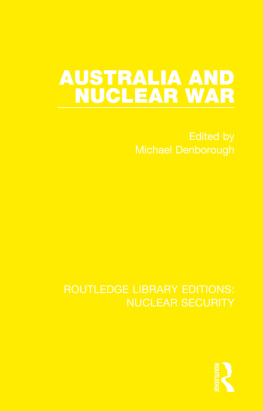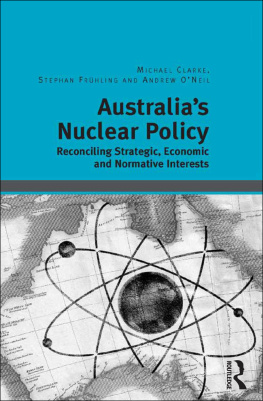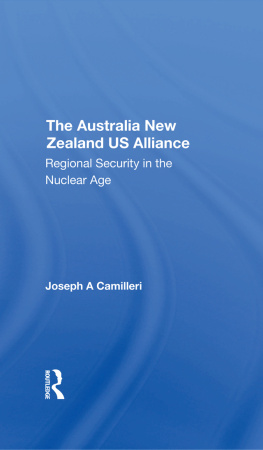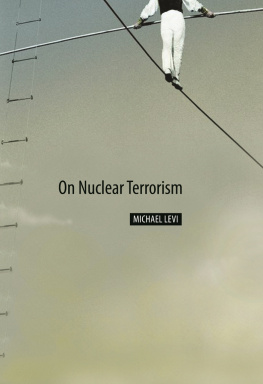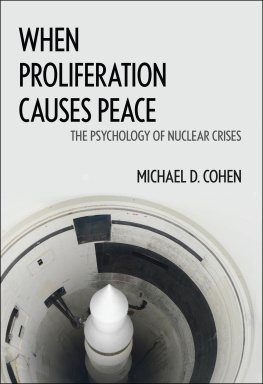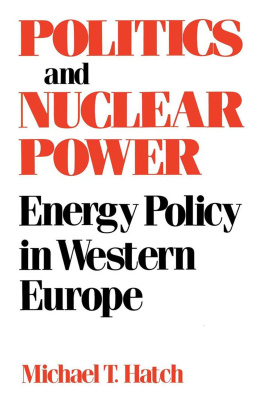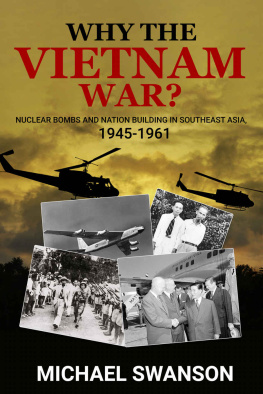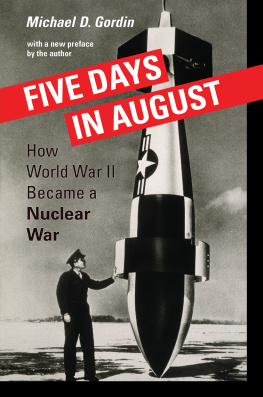ROUTLEDGE LIBRARY EDITIONS: NUCLEAR SECURITY
Volume 23
AUSTRALIA AND NUCLEAR WAR
First published in 1983 by Croom Helm Australia
This edition first published in 2021
by Routledge
2 Park Square, Milton Park, Abingdon, Oxon OX14 4RN
and by Routledge
52 Vanderbilt Avenue, New York, NY 10017
Routledge is an imprint of the Taylor & Francis Group, an informa business
1983 Centre for Continuing Education, Australian National University
All rights reserved. No part of this book may be reprinted or reproduced or utilised in any form or by any electronic, mechanical, or other means, now known or hereafter invented, including photocopying and recording, or in any information storage or retrieval system, without permission in writing from the publishers.
Trademark notice: Product or corporate names may be trademarks or registered trademarks, and are used only for identification and explanation without intent to infringe.
British Library Cataloguing in Publication Data
A catalogue record for this book is available from the British Library
ISBN: 978-0-367-50682-7 (Set)
ISBN: 978-1-00-309763-1 (Set) (ebk)
ISBN: 978-0-367-52938-3 (Volume 23) (hbk)
ISBN: 978-1-00-308013-8 (Volume 23) (ebk)
Publishers Note
The publisher has gone to great lengths to ensure the quality of this reprint but points out that some imperfections in the original copies may be apparent.
Disclaimer
The publisher has made every effort to trace copyright holders and would welcome correspondence from those they have been unable to trace.
AUSTRALIA AND NUCLEAR WAR
Edited by Michael Denborough
1983 Centre for Continuing Education, Australian National University
Croom Helm Australia Pty Ltd, 28 Kembla Street, Fyshwick, ACT 2609
Croom Helm Ltd, Provident House, Burrell Row, Beckenham, Kent BR3 1AT
Australian Library Cataloguing-in-Publication Data
Australia and nuclear war
Includes bibliographical references and index
ISBN O 949614 05 X
ISBN O 949614 09 2 (pbk.)
1. Atomic warfare. 2. Australia National security. I. Denborough, M. A. (Michael Antony), 1929-
355 .0217
Typeset and Printed by Southwood Press, Sydney
To the children of the world
All royalties are to be paid to the Australian National Universitv Fund for the Prevention of Nuclear War.
CONTENTS
P. H. Karmel
Michael Denborough
Frank Barnaby
Desmond Ball and R. H. Mathams
John Longmore
Michael Denborough
J. A. Ward
Judy Irving and Heather Ogilvie
H. C. Coombs
A. Barrie Pittock
I. E. Galbally, P. J. Crutzen and H. Rodhe
Bernard Feld
Oleg Gavrilov
David Hackworth
Roland Vogt
Susan Ryan
Nancy Shelley
Patrick White
Guide
Planning for the symposium which led to this book, began in April 1982. The Steering Committee members were: Professor Frank Barnaby, Mrs Wendy Barnaby, Mrs Maureen Barnett, Dr Stephen Boyden, Dr H. C. Coombs, Dr Michael Denborough (Chairman), Ms Jane Kriegel, Mr Hugh Littlewood, Mrs Suzanne Ridley, Dr Hugh Saddler, Professor Ralph Slatyer, Mr David Ingle Smith, Professor G. H. Taylor and Mr Robyn Williams.
From January 1983, the detailed organisation of the symposium, which was entitled The Consequences of Nuclear War for Australia and its Region was carried out by the Centre for Continuing Education at the Australian National University. Those who were involved included Mrs Dorothy Davis, Dr Michael Denborough, Dr Chris Duke, Ms Jane Kriegel, Ms Ann Mackay, Mr Brendan ODwyer, Ms Judy Pearce, Mr Colin Plowman and Mrs Beth Stoodley. Mrs Maureen Barnett, Co-ordinator of University Information, Mr John Dash and Mr Sean Whelan publicised the symposium, which was held at the Australian National University on May 30 and 31, 1983.
I am indebted to Mrs Stella Cornelius for her advice in the organisation of the symposium. Mr Nicholas Williams, Mrs Suzanne Ridley, Mrs Erica Den borough and Mrs Leigh van Haalen were very helpful in preparing the book. Mr Stephen Cole carried out the artwork.
Michael Denborough
Desmond Ball is Senior Fellow at the Strategic and Defence Studies Centre, Australian National University.
Frank Barnaby is Professor of Peace Studies at the Free University of Amsterdam.
H. C. Coombs is Visiting Fellow at the Centre for Resource and Environmental Studies, Australian National University.
P. J. Crutzen is Director of the Max Planck Institute for Chemistry, Mainz, West Germany.
Michael Denborough is Professorial Fellow at the Department of Medicine and Clinical Science, John Curtin School of Medical Research, Australian National University.
Bernard Feld is Professor of Physics at Massachussetts Institute of Technology.
I. E. Galbally is Principal Research Scientist at the CSIRO Division of Atmospheric Research.
Oleg Gavrilov is Chairman of the Medical Council, Ministry of Health, USSR.
David Hackworth is the most decorated soldier in US military history, but has now left the army and lives in Australia.
Judy Irving is an independent American film-maker.
John Longmore is Economic Adviser to the Treasurer of Australia.
R. H. Mathams is Former Director of Scientific and Technical Intelligence for the Joint Intelligence Organisation.
Heather Ogilvie is from the Sydney Filmmakers Co-Operative.
Barrie Pittock is Principal Research Scientist at the CSIRO Division of Atmospheric Research.
H. Rodhe is Professor of Chemical Meteorology at the University of Stockholm.
Susan Ryan is Minister for Education and Youth Affairs and Minister Assisting the Prime Minister on the Status of Women.
Nancy Shelley is a Canberra peace activist.
Roland Vogt is a Member of Parliament in the Federal Republic of Germany representing the Green Party.
J. A. Ward is Secretary of the Australian branch of the Medical Association for Prevention of War.
Patrick White is a Nobel Prize winning author.
This book examines the possibility of nuclear war, its implications in human terms and strategies for avoiding it. It reflects the desire of men and women to mobilise their intellectual efforts to come to grips with the massive problems involved. We are considering the very survival of the human race and the civilisation built up over several millennia. Nations and cultures have recovered from conventional war - even from what we used to call total war - in a comparatively short time, but the consequences of nuclear war may well be irreversible.
This is an emotional issue. A university should not avoid issues simply because they arouse strong emotions. Nevertheless, the task of a university is not to dwell on the emotional content of an issue - we have no special expertise in that. What we can do is subject the issue itself and its diverse components to dispassionate and objectively critical analysis. By these means, we may learn to develop strategies for averting nuclear disaster. I hope that the Australian National University has made a significant contribution to this all important cause by arranging the symposium which has led to this book.


